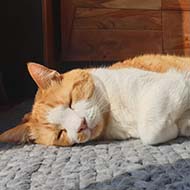Electrochemotherapy treatment saves cat with painful tumour

Pictured: Acai the cat.
Veterinary professionals at North Downs Specialist Referrals are 'delighted' after a cat with tongue cancer is doing well after receiving electrochemotherapy treatment.
Acai the cat is receiving treatment from oncology specialist Gerry Polton, oncology service director at North Downs Specialist Referrals.
Gerry, who has described Acai's progress as 'extraordinary', commented on Acai's diagnosis: “Acai is a lovely big cat who was diagnosed with a squamous cell carcinoma on the underside of his tongue.
“This is a painful and destructive tumour and, normally, life expectancy for these cases is only about 50 days, with appropriate pain relief.”
With little to no treatment options for Acai's condition, the specialist decided that he was a strong candidate to receive electrochemotherapy treatment, and Acai began treatment in April 2020.
Electrochemotherapy treatment combines a low dose of a chemotherapy drug and an electrical pulse, applied directly by an electrode. When this electrical pulse is applied, the cells form pores, allowing the drug to enter.
The practice found that Acai was incredibly receptive to the treatment, with the tumour resolving visibly and the mass being no longer apparent after only three treatments.
After the first course of treatment, which involved six treatments, Acai remained in remission until February 2021, when he then received further electrochemotherapy.
Gerry commented on this process: “We performed two treatments two weeks apart but Acai lost his appetite after the second treatment, so no more were given.
“We expected that the tumour would begin to progress quite rapidly but remarkably he has responded so well and has got his appetite back.
“It is now 18 months since the lump was first identified and the fact that he is happy and well at this point is extraordinary.
“We’re delighted and want to share this success story to raise awareness of the treatment so that other cats can benefit from it”



 The RCVS has announced a new version of its 1CPD mobile app, with enhanced features for veterinary surgeons and veterinary nurses to record their continuing professional development.
The RCVS has announced a new version of its 1CPD mobile app, with enhanced features for veterinary surgeons and veterinary nurses to record their continuing professional development.